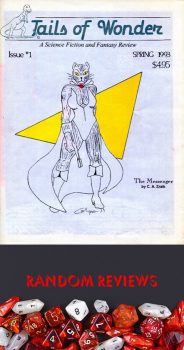Random Reviews: “S.P.S.” by Edo van Belkom

Throughout 2022, I’ll be reviewing short stories. Some of these may be classics, others forgotten. The two things that all will have in common is that they are part of my personal collection and they will be selected through a randomization process. What works and authors I look at will be entirely selected by a roll of the dice.
One of the magazines in my collection is the first issue of Tails of Wonder, dated Spring 1993 and edited by Nicolas Samuels. According to a card tucked into the issue, the magazine was previously called (or meant to be called Sharp Tooth), but a name change occurred prior to publication. The magazine does not seem to have any existence on the internet that was just beginning to appear when it was released and most of the authors who appeared in its pages do not seem to have gone on to publish anything else. I have not been able to tell if there was ever a Tails of Wonder issue #2.
Among the authors who did continue to publish after their appearance in Tails of Wonder was Edo van Belkom, who had already been publishing fiction for three years, under both his own name and the pseudonym Evan Hollander. His contribution to Tails of Wonder is the short story “S.P.S.” He would reprint the story in his 1998 collection Death Drives a Semi.
By 1993, the idea of virtual reality was mainstream enough that the next year the television show Mad About You included an episode in which one of the main characters decided to invest in a virtual reality device. In van Belkom’s story, “S.P.S.” stands for “sensory perception simulators” and are beginning to be marketed to the general public. The story is told from the point of view of the woman whose husband, Marty, has decided to buy one of the units.
Right from the beginning of the story, with the opening line, “My husband died during childbirth,” the reader knows this story isn’t going to have a particularly happy ending. However in the slightly over two pages the story runs, van Belkom manages to accomplish a great deal with both technological extrapolation and character.